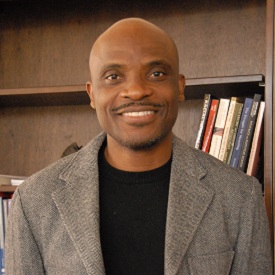Didier Gondola

IU School of Liberal Arts
History Department Chair, Professor of History
Fulbright Research Scholarship
Republic of Congo, 2008
What was your project about?
My research was about youth violence. I examined the ways in which young people in colonial Kinshasa (Congo) used images from the American cowboy movies to reshape existing patterns of masculinity. This is a part of a long-term study that started with my PhD dissertation. There is not a lot of archival data available on this topic, which is essential for understanding urban identities in Congo. The Fulbright research fellowship afforded me the opportunity to carry out my field research in Kinshasa and collect a great deal of oral data and a few archival documents. After returning to IU Indianapolis, I successfully applied for a European Institutes for Advanced Study (EURIAS) fellowship to focus exclusively on writing my book manuscript. I resided in Nantes, France, as a fellow at the IEA Nantes.
What was your contribution to the host country?
I am originally from the Republic of Congo. The ability to speak the local languages helped me to connect immediately with people in Kinshasa and make myself available for different community activities. Being a sort of “intellectual ambassador,” which is what most U.S. Fulbrighters end up being, also required providing some service to the host country. It was impossible to turn down these requests, not because I felt obliged to, but because it was a way for me to give back to a community to which I owe so much. I thought teaching was a good way to do that. Although my Fulbright was strictly a research fellowship, I taught two seminars for the Demography Department and the History Department of the Université Nationale de Kinshasa (UNIKIN). Since my Fulbright residence in Kinshasa coincided with the 2008 presidential election in the US, people there were particularly interested in knowing my views on the potential election of a candidate of African descent. I was invited to intervene on various media channels. These were occasions to create different streams of communication with local people.
What were the benefits of the Fulbright project?
Aside for allowing me to further my research project, the Fulbright fellowship enabled me to take my sons to the country where I was born. They went to The American School of Kinshasa (TASOK), thanks to the Fulbright Program dependent benefits, and were able to see for themselves the challenges of living in a developing country. They also volunteered as English instructors at my former elementary school in Kinshasa to fulfill their community service requirement at the TASOK. I had an office at the American Embassy in Congo and the logistics there were quite impeccable.
The opportunity to teach at UNIKIN was exciting and something that I had always dreamed about as an African historian based in the US. My style of teaching was something completely new to the students at UNIKIN who are used to being lectured and having notes provided beforehand by their instructor. A more conversational and participatory lecture style unsettled many students. But in the end, students took it in stride and were grateful that I sought and valued their opinions.
What kind of challenges did you confront?
Life in Kinshasa has many challenges that most Americans would not be able to fathom. Oftentimes we had water shortage for days on end. We did like all people do in Kinshasa, which was to store gallons of water in huge plastic barrels. At six in the evening power went out and we would scramble to light up our battery-powered lights that we kept in each room. Of course, mosquito nets that we brought with us from the US came really in handy. But all these challenges were mitigated by the fact that I knew the culture, spoke the languages, and could easily relate to the people.
What would you recommend to the Fulbright applicants?
Fulbright candidates should learn about the host place as much as they can and have a realistic plan. If they do not have proficiency in any of the local languages, they may face some challenges and be unable to fully benefit from the Fulbright experience. I think nobody should step in a foreign country with the idea that everyone there speaks English. I also strongly encourage scholars applying for the Fulbright to establish and maintain relationships with colleagues at the host university, get to know people there, and aggressively seek as much information as possible. In short, preparation and planning are of utmost importance. One last thing that I would recommend is not to miss the orientation that the Fulbright program convenes in Washington DC as it provides new Fulbrighters the opportunity to connect with former Fulbrighters and get a fuller picture of the program and their host country.
